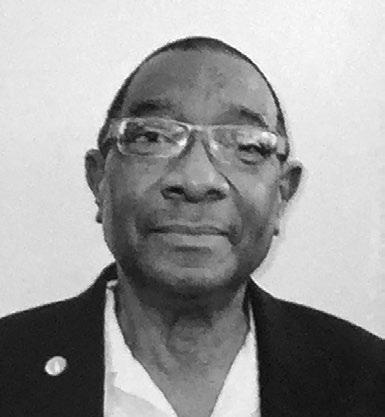
5 minute read
Dementia Prevalence Set To Increase In The Caribbean
Despite recent statistics showing that dementia prevalence is set to increase in the Caribbean by 155 per cent by 2050, regional progress in tackling the neurodegenerative condition is far too slow. The latest estimates show that there will be over 740,000 people living with dementia in the Caribbean by 2050.
That’s the word from the Alzheimer’s Disease International, (ADI), the global federation for 105 Alzheimer’s and dementia associations across the world.
Advertisement
Research has found that the greatest risk factors for dementia in the Caribbean include Cardiovascular health, diabetes, family history, older age, education. Further, women with lower levels of education in rural areas are overrepresented in dementia statistics in the Caribbean.
Daisy Acosta, co-founder of The Asociacion Domincana de Alzheimer and former Chair of ADI, says that the issue of dementia in the Caribbean is growing.
“Dementia is a real problem in our Caribbean countries. By 2050 almost 750,000 people will be living with dementia in region,” Acosta said. “Governments are not paying enough attention to because it is often still wrongly considered a normal part of ageing. Well IT IS NOT! Key policies can be taken that can help delay or
Cancer Is Second Leading Cause Of Deaths In The Caribbean
Cancer continues to be the second leading cause of deaths in the Caribbean according Dr. Joy St. John, Executive Director at the Caribbean Public Health Agency, (CARPHA). The disease account for a fifth of all deaths.
In 2020, over 100,000 new cancer cases and over 65,000 cancer deaths in the Caribbean were estimated. Female breast cancer accounted for the most cancer cases in the Caribbean at 15%, while lung cancer caused the most cancer deaths at 12%. Prostate, colorectal and stomach cancers are also common.
“Up to 50% of cancer cases are preventable, and 27% of cancers relate to alcohol and tobacco use. People can reduce their risk of getting certain types of cancer by adopting healthy lifestyles and practicing suitable health seeking behaviours,” stated Dr. St. John.
She suggests adopting healthier behaviours can help to reduce your risk of cancer.
“The less alcohol you drink, the lower your risk of cancer,” she said while suggesting people avoid tobacco products and exposure to second-hand smoke; increase physical activity and eat foods low in salt, sugar and harmful fats.
Worldwide, cancer is the second leading cause of death, causing one-sixth of all deaths. In 2020, there were 19.3 million new cancer cases, with breast, lung, prostate, skin and colon cancers being the most common; and there were 10 million cancer deaths in that same year.
In Florida, there’s an average of 115,000 new cancers diagnosed and reported each year to the state-wide cancer registry, the Florida Cancer Data System.
Final Expense Insurance
So many of us are unprepared nancially when our Love One dies, or more unfortunate, when we die.
Now is the time for us to consider a nal expense plan, which would eliminate the confusion and headache of funding funeral expenses from our savings.
Neville Sharpe will carefully explain how you can receive between $7,000 and $50,000 for funeral expenses within 24 hours after producing a death certi cate. No more begging for help from strangers, protect your self-respect.

Everything will be taken care of, the Funeral Director, the plot and other expense, leaving you time to grieve.
reduce up to 40 per cent of the number of cases of dementia in the future. I urge our governments to invest now to save later!”
The ADI is calling for the public across the Caribbean to urge their governments to take urgent action on dementia.
Only 16 per cent of Caribbean countries and territories have made progress in developing a National Dementia Plan, most of which have inadequate funding. While a few countries in the region, like the Dominican Republic and Cuba have implemented National Dementia Plans, unfortunately most are without adequate funding.
ADI has teamed up with
Alzheimer’s associations in Bahamas, Barbados, Bonaire, British Virgin Islands, Cayman Islands, Dominica, Jamaica, Grenada, Puerto Rico, Saint Kitts and Nevis, Sint Maarten, St Lucia, and Trinidad and Tobago to launch a regional campaign ‘What’s Your Plan’ (#WhatsYourPlan).
But the Caribbean ADI members participating in the #WhatsYourPlan campaign are yet to have any fully funded, implemented National Dementia Plan in their countries.
ADI is calling on people living in Caribbean countries participating in the #WhatsYourPlan campaign to urge their governments to develop a National
Dementia Plan that features, improvements in care for those living with dementia, support for carers and to implement key policies to help delay or reduce up to 40 percent of the possible number of cases of dementia in the future.
Risk reduction should be designed with a life-course approach in mind, targeting both older and younger populations, with a focus on the modifiable 12 risk factors estimated to contribute to 40 percent of the cases of those living with dementia.
- NewsAmericasNow.com
Florida To Open Medical Marijuana License Applications
Florida health officials will accept applications for 22 medical marijuana licenses in late April, in a long-awaited move.
An emergency rule about the licenses generated an immediate buzz in the cannabis industry, as the number of licenses in the state will double.
YThe rule came more than six years after Florida voters approved a constitutional amendment broadly authorizing medical marijuana and after lawmakers in 2017 approved a framework for the industry.
The Florida Department of Health in December set up the process to apply for new licenses, with applications accepted in “batching cycles.” Under the emergency rule, 22 licenses will be available, adding to the 22 currently licensed operators. The department will accept applications between April 24th and April 28th.
The application window will be the first major opportunity for newcomers to the state’s cannabis market to vie for licenses since the 2017 legislation passed. An earlier round of licenses was based on a 2014 law that legalized noneuphoric cannabis for a limited number of patients.
Investors and marijuana operators for years have viewed Florida as potentially one of the country’s premiere landscapes to set up shop.
Medical Educational Loan Debt Relief Application Now Open
The Florida Department of Health has launched the Florida Reimbursement Assistance for Medical Education (FRAME) portal for the 2023 application cycle. The FRAME program provides medical education loan debt relief to health care professionals practicing in less populated areas of the state.
In July 2022, Governor Ron DeSantis and the Florida Legislature directed nearly $6.6 million in funding to expand access to primary care health services utilizing the FRAME program. FRAME encourages qualified health care professionals to practice in underserved areas across the state, by providing annual payments intended to offset the loans and educational expenses leading to medical or nursing degrees.
Through the FRAME program, physicians, physician assistants, and nursing professionals may be eligible for an annual award of up to $20,000 toward the remaining principal of their educational loans. To be eligible, providers must have a primary care specialty and currently provide services within a federally designated Health Professional Shortage Area (HPSA) or statutorily specified facility type.
Applications for FRAME funding will be prioritized based on a combined factor of direct patient care hours provided in a HPSA, the HPSA score, and the length of continued service of the applicant in the HPSA(s). Funding will be distributed by prioritization score.
Applications can be submitted on the FRAMEworks portal at fdohframe.com/s/ or by mail during the application cycle between February 1, 2023, and March 31, 2023. Award determinations will be made by June 1, 2023.










